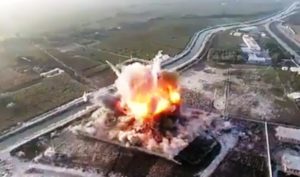
The region is known today as Afghanistan has been subjugated to a series of warfare since the Soviet occupation, till date, including the United States, led NATO, is on in full swing. Afghanistan shares its borders with multiple countries, including Pakistan. The unrest in Afghanistan has been a major cause of instability of the region, including the spread of terrorism in the neighbouring countries, particularly along the Afghanistan-Pakistan border. The people of these areas known by the ethnicity of “Pashtuns” have been the major affected population of the unrest. From training those to become the U.S. backed “mujahideen” against the former USSR to unleashing the war on terror against them when they started to retaliate, Pashtuns are the sufferers.
The purpose of the mention of this scenario basically highlights the fact that the people of Pakistan and Afghanistan- the Pashtuns- have witnessed a very prolonged war. This is a war that is neither the creation of their own, nor concerns them directly. It is a war with no clear end, with no particular benefit and it is only hurting the people. In fact, this long war has brought miseries to the people of Afghanistan and the region, that now must end.
The insurgencies in Afghanistan have resulted in the worsening of security situations in Pakistan, as is evident through the course of history. Finally, these insurgencies took the shape of suicide bombings to widespread terror attacks that resulted in large-scale life and property losses. In Pakistan, the the spill over of terrorism from Afghanistan has been rooted out successfully with the success of the “Zarb-e-Azb” and the ongoing operation “Rad-UL-Fassad. Although Pakistan has achieved this grand success after giving immense human sacrifices and suffering heavy economic losses.
The recently announced US Strategy / Policy on Afghanistan is also going to have a significant effect on the future regional developments. The salient points of president Trump’s Afghan Policy announced in 2017 can be summarized under six main headings:
- Troop Levels: Pentagon authorized to ramp up troop numbers, who will be engaged in counterterrorism and training activities.
- Military Autonomy: Military commander were delegated authority to act in real time and expand the US operations to target terrorists and criminal networks in Afghanistan.
- Open-ended: No fixed timelines were given for completion of the mission in Afghanistan.
- Fighting Enemies: But Not Nation-building. Victory in Afghanistan will mean “attacking our enemies” and “obliterating” the Islamic State group. Vowed to crush al-Qaeda, prevent the Taliban from taking over the country, and stop terror attacks against Americans. The US will continue to work with the Afghan government, “however, US commitment is not unlimited, and support is not a blank cheque” and the US would not engage in “nation-building”.
- Pakistan Bashing: The US “can no longer be silent” about alleged terrorist safe havens in Pakistan. Trump alleged that Pakistan often gives sanctuary to “agents of chaos, violence, and terror”, the Taliban and other groups who pose a threat to the region and beyond.
- Enhanced Indian Role: India to help more in Afghanistan, especially in the areas of economic assistance and development.
These stated interests call for a continued, ongoing unrest in the region. While the U.S. does not realize its own failings in Afghanistan, to cover up its own failures it asks Pakistan to “DO MORE”. In this context, it should be realized by the US and its other allies that Pakistan has already played a major part in the war on terror by defeating terrorism in its border regions with Afghanistan and elsewhere in the country by giving sacrifices much more than what the US and NATO forces have suffered from. Therefore it is the US who has to review its policies in Afghanistan and find a solution to the conflict there to bring peace to the region.
The United States Government should now realize that the people of Afghanistan and Pakistan have suffered too much from the war on terror and its backlash in the form of terrorist incidents. Especially Afghanistan people who have suffered since last 40 years want relief and peaceful conditions to resettle in their houses. The region also wants peace to focus on its economic development and the welfare of its people. It is, therefore, better than the US initiates peace talks with the Taliban along with other Afghan groups to agree on a formula of US withdrawal from Afghanistan and holding free and fair elections in Afghan to form a government that is acceptable to all Afghans. This is the only way to end the war and bring peace in the region, so that the people of this region could also lead a normal life, like the people of other regions.
